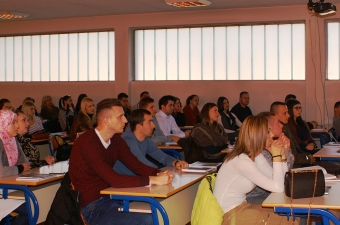Law students from Travnik and Bihać learn about guilty pleas before ICTY
Travnik and Bihać, 1-2 December 2016
As part of the Tribunal’s Youth Outreach Project, ICTY representative Mr Almir Alić delivered two lectures last week on the topic of “Guilty Pleas in the practice of the ICTY”. The lectures were held at the International University in Travnik and the Law Faculty of Bihać University, both located in Bosnia and Herzegovina. More than 90 students and teaching staff heard about the 20 cases in which persons indicted by the Tribunal pleaded guilty, and how plea agreements work in practice.
The students learned about the applicable law, history and other specifics of guilty pleas before the ICTY, starting from the first guilty plea entered by Dražen Erdemović to the last one made in the Dragan Zelenović case.
The students had numerous questions and comments about the practice of plea bargaining before the ICTY and discussed the question of guilty pleas for serious violations of international humanitarian law. Many found the Tribunal’s sentencing practice to be too lenient in those cases where a plea agreement was reached between the Prosecution and the Accused. One student cited the example of Ms Biljana Plavšić, stating that her guilty plea is extremely controversial. Others pointed out that the remorse of an Accused, which is taken into account as a mitigating circumstance, is very difficult to prove.
The use of guilty pleas before the ICTY is a “much debated but little-known topic”, said a student of the International University in Travnik, stressing the importance of integrating elements of the Youth Outreach project into education programmes in the former Yugoslavia.


